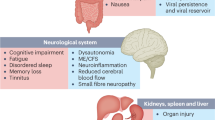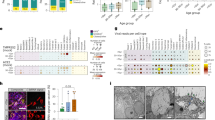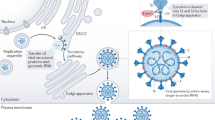Abstract
Intestinal microbial dysbiosis has been described in individuals with an HIV-1 infection and may underlie persistent inflammation in chronic infection, thereby contributing to disease progression. Herein, we induced an HIV-1-like intestinal dysbiosis in rhesus macaques (Macaca mulatta) with vancomycin treatment and assessed the contribution of dysbiosis to SIV disease progression. Dysbiotic and control animals had similar disease progression, indicating that intestinal microbial dysbiosis similar to that observed in individuals with HIV is not sufficient to accelerate untreated lentiviral disease progression.
This is a preview of subscription content, access via your institution
Access options
Access Nature and 54 other Nature Portfolio journals
Get Nature+, our best-value online-access subscription
$29.99 / 30 days
cancel any time
Subscribe to this journal
Receive 12 print issues and online access
$209.00 per year
only $17.42 per issue
Buy this article
- Purchase on Springer Link
- Instant access to full article PDF
Prices may be subject to local taxes which are calculated during checkout


Similar content being viewed by others
References
Ortiz, A. M. & Brenchley, J. M. Curr. Opin. HIV AIDS 13, 15–21 (2018).
Brenchley, J. M., Silvestri, G. & Douek, D. C. Immunity 32, 737–742 (2010).
Noguera-Julian, M. et al. EBioMedicine 5, 135–146 (2016).
Policicchio, B. B., Pandrea, I. & Apetrei, C. Front. Immunol. 7, 12 (2016).
Mudd, J. C. & Brenchley, J. M. J. Infect. Dis. 214 Suppl 2, S58–S66 (2016).
Ivanov, I. I. et al. Cell 139, 485–498 (2009).
Kelly, C. J. et al. Cell Host Microbe 17, 662–671 (2015).
Day, C. L. et al. Nature 443, 350–354 (2006).
Betts, M. R. et al. Blood 107, 4781–4789 (2006).
McKenna, P. et al. PLoS Pathog. 4, e20 (2008).
Gosmann, C. et al. Immunity 46, 29–37 (2017).
d’Ettorre, G. et al. Immun. Inflamm. Dis. 5, 244–260 (2017).
Vujkovic-Cvijin, I. et al. Gut Microbes 8, 440–450 (2017).
Hager, C. L. & Ghannoum, M. A. Curr. Opin. HIV AIDS 13, 69–72 (2018).
Ortiz, A. M. et al. Mucosal Immunol. 9, 458–467 (2016).
Caporaso, J. G. et al. Nat. Methods 7, 335–336 (2010).
Langille, M. G. et al. Nat. Biotechnol. 31, 814–821 (2013).
Estes, J. D. et al. PLoS Pathog. 6, e1001052 (2010).
Hao, X. P. et al. Nat. Commun. 6, 8020 (2015).
Brenchley, J. M. et al. Blood 120, 4172–4181 (2012).
Segata, N. et al. Genome Biol. 12, R60 (2011).
Parks, D. H., Tyson, G. W., Hugenholtz, P. & Beiko, R. G. Bioinformatics 30, 3123–3124 (2014).
Acknowledgements
We would like to acknowledge H. Kendall, J. Swerczek, R. Herbert, and all the veterinary staff at the NIH animal center. We would like to thank M. Quiñones, J. Davis, S. Sen and G. Trinchieri, and the NIAID Microbiome Program for technical and analytical assistance. Funding for this study was provided in part by the Division of Intramural Research/NIAID/NIH, by the Oregon National Primate Research Center NIH grant award P51OD011092, and with federal funds from the National Cancer Institute, NIH, under Contract No. HHSN261200800001E. The content of this publication does not necessarily reflect the views or policies of the Department of Health and Human Services (DHHS), nor does the mention of trade names, commercial products, or organizations imply endorsement by the U.S. Government.
Author information
Authors and Affiliations
Contributions
J.M.B. conceived the project. A.M.O. and J.M.B. designed the project and wrote the manuscript. A.M.O., J.K.F., S.R.D., C.E.C.S., S.H.L., M.E.L., O.S., C.L.V., J.C.M., L.J., K.B.-S., J.D.E. and J.M.B. performed experiments. A.M.O., J.K.F., S.R.D., I.V.-C., S.H.L., Y.B., J.D.E. and J.M.B. analyzed data.
Corresponding author
Ethics declarations
Competing interests
The authors declare no competing interests.
Additional information
Publisher’s note: Springer Nature remains neutral with regard to jurisdictional claims in published maps and institutional affiliations.
Supplementary information
Supplementary Text and Figures
Supplementary Figures 1–8 and Supplementary Table 1
Supplementary Dataset 1
LEFSE returned results
Rights and permissions
About this article
Cite this article
Ortiz, A.M., Flynn, J.K., DiNapoli, S.R. et al. Experimental microbial dysbiosis does not promote disease progression in SIV-infected macaques. Nat Med 24, 1313–1316 (2018). https://doi.org/10.1038/s41591-018-0132-5
Received:
Accepted:
Published:
Issue Date:
DOI: https://doi.org/10.1038/s41591-018-0132-5
This article is cited by
-
Butyrate administration is not sufficient to improve immune reconstitution in antiretroviral-treated SIV-infected macaques
Scientific Reports (2022)
-
Longitudinal multi-omics analyses of the gut–liver axis reveals metabolic dysregulation in hepatitis C infection and cirrhosis
Nature Microbiology (2022)
-
Microbiome Studies in Non-human Primates
Current HIV/AIDS Reports (2021)
-
Maturation of the infant rhesus macaque gut microbiome and its role in the development of diarrheal disease
Genome Biology (2019)
-
HIV and the Gut Microbiota: Composition, Consequences, and Avenues for Amelioration
Current HIV/AIDS Reports (2019)



